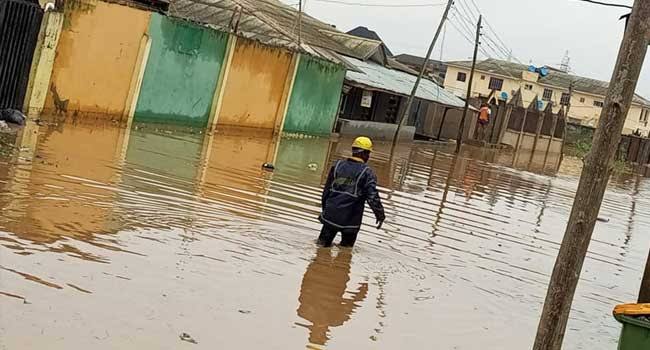Daud Olatunji
Over the past five years, Nigeria has grappled with the devastating impacts of climate change, suffering significant losses in human lives, properties, and economic assets. Data from the National Emergency Management Agency (NEMA) and other related agencies reveal a grim picture of escalating natural disasters fueled by global warming, poor environmental policies, and insufficient disaster preparedness.
Between 2020 and 2024, climate-related events have cost the nation billions of naira, displaced millions, and left trails of destruction in nearly every region.
… Floods: A Recurring Nightmare
Among the most catastrophic events were the floods that wreaked havoc across Nigeria.
In 2022 alone, NEMA recorded over 612 deaths and the displacement of 1.4 million people due to floods in states like Bayelsa, Kogi, and Jigawa. Farmlands spanning hundreds of thousands of hectares were submerged, leading to food shortages and inflation.
The financial losses from these floods were estimated at over N4 trillion.
The River Niger and Benue basins, overwhelmed by torrential rains and poor dam management, became symbols of climate change’s devastating reach.
In 2023, Lagos and Ogun States faced severe urban flooding after prolonged rainfall. In Lagos, many low-lying areas like Lekki and Ajah turned into waterlogged zones, with residents forced to abandon homes and businesses.
Reports revealed that Lagos alone lost over N30 billion to the disaster, as infrastructure crumbled and commerce halted.
Ogun’s communities of Abeokuta and Ifo were similarly affected, with lives lost and properties destroyed.
… Desertification and Droughts in the North
Northern Nigeria has faced unrelenting desertification and drought, particularly in states like Borno, Yobe, and Kano. Desert encroachment has claimed thousands of hectares of arable land, displacing farming communities and escalating food insecurity.
In 2021, the Federal Ministry of Environment reported that the country was losing an estimated 351,000 hectares of land annually to desertification, costing over N150 billion in economic losses.
The droughts have also exacerbated conflicts between farmers and herders, as shrinking grazing lands and water sources fuel violent clashes.
States like Benue and Plateau have become flashpoints, with the loss of over 500 lives attributed to such clashes in 2023 alone.
… Rising Heatwaves and Public Health Crises
Another deadly dimension of climate change is the rise in extreme heatwaves, particularly in northern and central Nigeria.
Temperatures exceeding 40°C have become more frequent, endangering human health and productivity.
In Sokoto and Kebbi States, heatwaves in 2021 were linked to the deaths of over 100 people, particularly vulnerable groups like children and the elderly.
Health crises, including the resurgence of diseases like cholera and malaria, have also been linked to climate change.
The rainy seasons have created breeding grounds for mosquitoes, while contaminated floodwaters have led to cholera outbreaks in states like Adamawa and Bauchi.
In 2022, a cholera outbreak claimed over 3,000 lives nationwide, with experts attributing its spread to poor sanitation exacerbated by climate-related flooding.
… Erosion in the South-East: The Silent Destroyer
In the South-East, gully erosion has devastated communities, swallowing homes, roads, and farmlands. In Anambra State, over 1,000 active erosion sites have been identified, with the government struggling to fund mitigation projects. The Federal Ministry of Works estimated losses from erosion in the region at over N200 billion between 2020 and 2024. Communities like Nanka and Agulu remain on the brink of collapse, with families living in perpetual fear of losing their homes to advancing gullies.
Oil Spills and Coastal Erosion in the Niger Delta
The Niger Delta, already plagued by oil spills and environmental degradation, has also borne the brunt of coastal erosion. Rising sea levels have claimed land and forced communities to migrate. According to a 2023 report by the Nigerian Institute for Oceanography, coastal erosion has reduced the Delta’s habitable landmass by 15% in five years. Combined with oil pollution, this has rendered vast swathes of land uninhabitable, displacing thousands and undermining livelihoods.
Economic Toll
Climate change has not only taken lives but also dealt a severe blow to Nigeria’s economy. According to NEMA, the cumulative financial losses from climate-related disasters between 2020 and 2024 exceed N10 trillion. Agriculture, which contributes about 25% of Nigeria’s GDP, has been severely affected, with climate events destroying crops and reducing productivity. The insurance sector has also been overwhelmed by claims, further destabilizing the economy.
Inadequate Response and Policy Gaps
While Nigeria has committed to global climate agreements like the Paris Accord, implementation at the national level remains weak. The government’s 2021 launch of the National Adaptation Strategy was criticized for its lack of funding and inadequate focus on vulnerable communities. Emergency responses by NEMA and state governments have often been reactive rather than proactive, with disaster victims frequently left without adequate relief.
Environmental experts have called for increased investment in climate-resilient infrastructure, robust early warning systems, and community-based adaptation strategies. Yet, political will remains low, with climate change often sidelined in national discourse.
A Call to Action
Nigeria stands at a crossroads. The evidence of climate change is undeniable, and the costs of inaction are mounting. From floods to desertification, the nation must prioritize climate resilience as a matter of national security. Bold policies, increased funding, and global partnerships are needed to protect lives and safeguard the future.
The time to act is now. Failure to do so will mean more losses—billions in naira and, more importantly, irreplaceable human lives.
Do you want to share a story with us? Do you want to advertise with us? Do you need publicity for a product, service, or event? Contact us on WhatsApp +2348183319097 Email: platformtimes@gmail.com
We are committed to impactful investigative journalism for human interest and social justice. Your donation will help us tell more stories. Kindly donate any amount HERE




